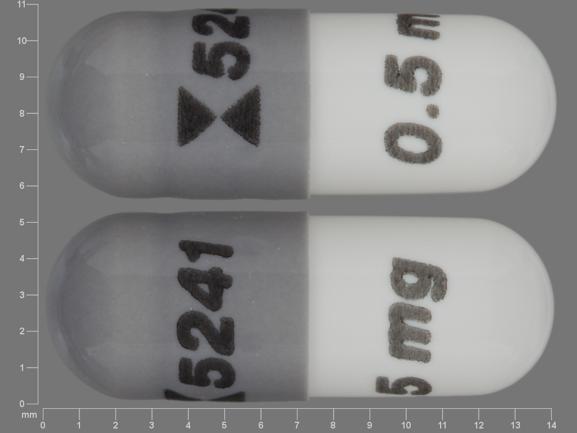Anagrelide Dosage
Medically reviewed by Drugs.com. Last updated on Apr 28, 2025.
Applies to the following strengths: 0.5 mg; 1 mg
Usual Adult Dose for:
Usual Pediatric Dose for:
Additional dosage information:
Usual Adult Dose for Thrombocythemia
Initial: 0.5 mg orally 4 times a day, or 1 mg orally twice a day, for a minimum of 7 days.
Maintenance: titrate to the lowest effective dosage required to reduce and maintain the platelet count at less than 600,000 cells/microliter, ideally down to normal levels. Increase the dosage by no more than 0.5 mg/day in any 1 week period.
The dosage should not exceed 10 mg/day or 2.5 mg in any single dose.
Usual Pediatric Dose for Chronic Myelogenous Leukemia
Initial dose: 0.5 mg orally daily (recommended) to 0.5 mg orally 4 times daily
Maintenance: titrate to the lowest effective dosage required to reduce and maintain the platelet count at less than 600,000 cells/microliter, ideally down to normal levels. Increase the dosage by no more than 0.5 mg/day in any 1 week period.
The dosage should not exceed 10 mg/day or 2.5 mg in any single dose.
Usual Pediatric Dose for Thrombocythemia
Initial dose: 0.5 mg orally daily (recommended) to 0.5 mg orally 4 times daily
Maintenance: titrate to the lowest effective dosage required to reduce and maintain the platelet count at less than 600,000 cells/microliter, ideally down to normal levels. Increase the dosage by no more than 0.5 mg/day in any 1 week period.
The dosage should not exceed 10 mg/day or 2.5 mg in any single dose.
Renal Dose Adjustments
Moderate hepatic impairment: Single 1 mg dose showed an 8-fold increase in total exposure (AUC) to anagrelide
Severe renal impairment (creatinine clearance less than 30 mL/min): Single 1 mg dose showed no significant effects on the pharmacokinetics of anagrelide
Liver Dose Adjustments
Use of anagrelide in patients with severe hepatic impairment is contraindicated. Patients with moderate hepatic impairment should receive a starting dose of 0.5 mg/day and be maintained at that dose for a minimum of 1 week (careful monitoring of cardiovascular effects should be instituted during this time). Incremental increases should not exceed more than 0.5 mg/day in any 1 week.
Dose Adjustments
Most patients will experience an adequate response at a dose of 1.5 to 3 mg/day.
Typically, platelet count begins to respond within 7 to 14 days at the proper dosage.
Precautions
- Anagrelide has not been studied in pediatric patients less than 7 years of age.
- Consult WARNINGS section for additional precautions.
Dialysis
Data not available
Other Comments
General: An increase in platelet count can be seen within 4 days after sudden discontinuation of this drug and a decrease to pretreatment levels occurs within 10 to 14 days.
Monitoring:
- Hematologic: Platelet count (every 2 days during the first week of treatment and at least weekly thereafter until the maintenance dosage is established); hemoglobin and white blood cells (during the first 2 weeks of treatment)
- Hepatic: ALT and AST (during the first 2 weeks of treatment)
- Renal: Serum creatinine and BUN (during the first 2 weeks of treatment)
Patient advice: Advise patients to immediately contact their doctor if they experience shortness of breath, swelling in the legs or ankles, or if their lips and skin turn a bluish color.
More about anagrelide
- Check interactions
- Compare alternatives
- Pricing & coupons
- Reviews (3)
- Drug images
- Latest FDA alerts (2)
- Side effects
- During pregnancy
- Drug class: miscellaneous coagulation modifiers
- Breastfeeding
- En español
Patient resources
Other brands
Professional resources
Other brands
Related treatment guides
See also:
Further information
Always consult your healthcare provider to ensure the information displayed on this page applies to your personal circumstances.


